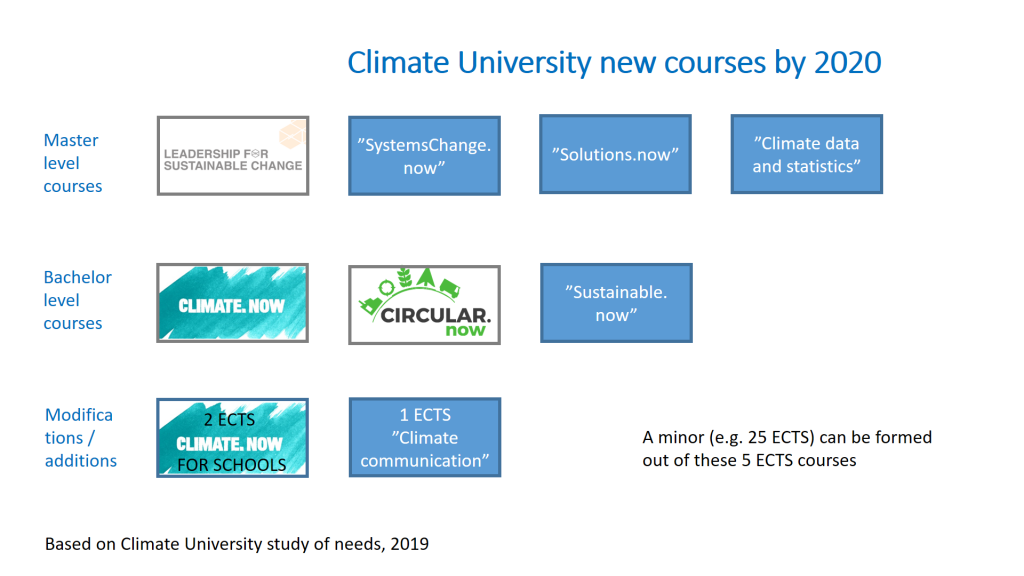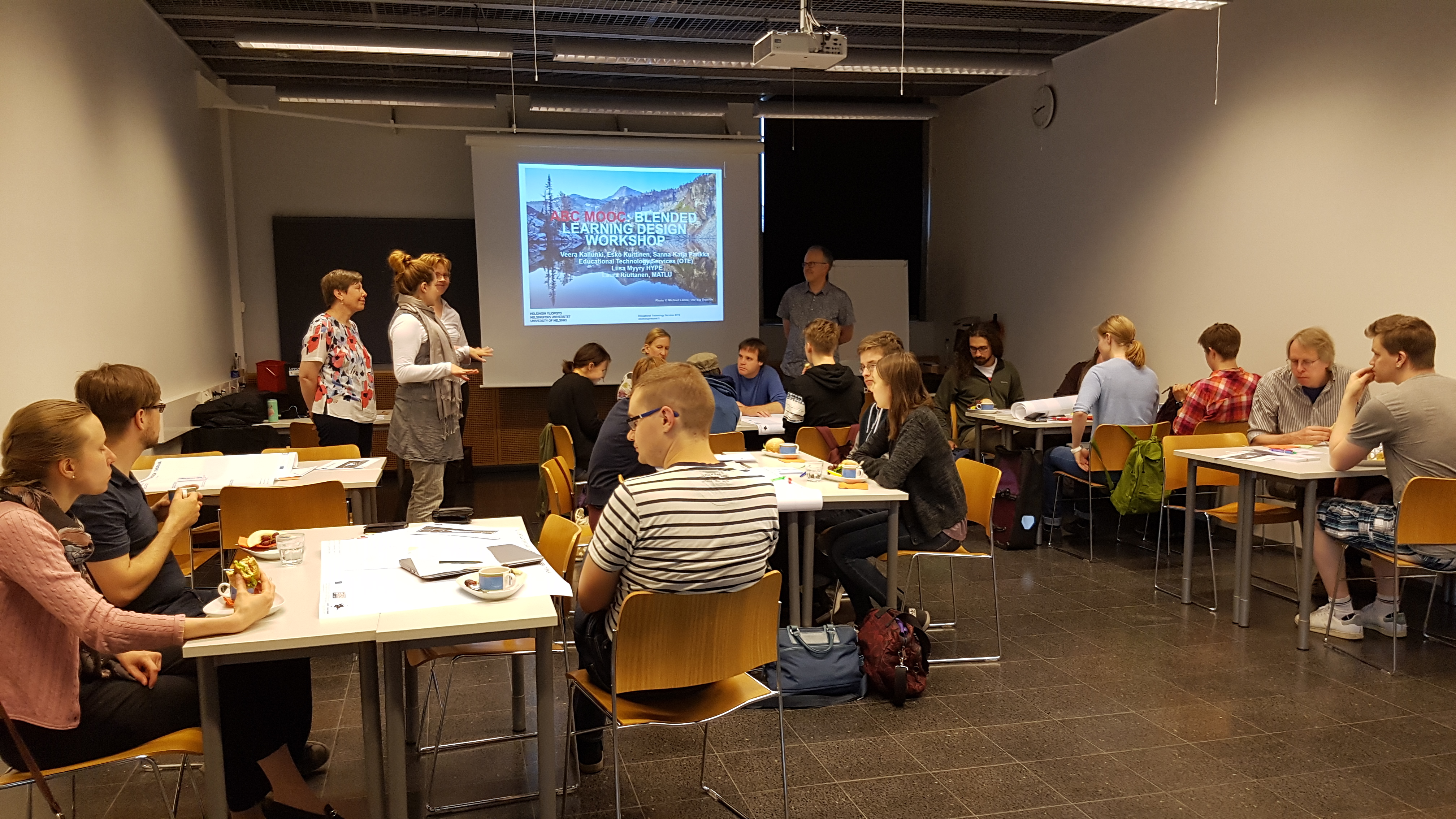Summary
Institution: University of Helsinki (Erasmus+ ABC to VLE project partner)
Description: Designing MOOCs for atmospheric and earth system sciences
Authors: Veera Kallunki and Sanna-Katja Parikka
Date: June 2019 and October 2019
Purpose of the ABC workshop: Based on the ongoing digital leap in education of the University of Helsinki, digitalisation in teaching and learning is facilitated by the ABC workshops in order to help teachers to cooperate in designing blended and e-learning university courses.
Course details: In this case study, several MOOCs about atmospheric and earth system topics were designed by the Climate University project and the Digital Leap of the Masters’ Programme in Atmospheric Sciences, ATM-MP in Finland. Climate University is a collaboration project of eleven Finnish universities. The project focuses on multidisciplinary digital learning in sustainability challenges and develops MOOCs to teach different sustainable topics. In our ABC workshops, there were researchers from INAR (Institut for Atmospheric and Earth System Research at the University of Helsinki), University of Turku, University of Jyväskylä, University of Oulu, Lappeenranta University of Technology, Aalto University, Tampere University, and Metropolia University of Applied Sciences.
In our workshops, the ATM-MP group developed the courses of The Basics of Climatology, The Basics of Meteorology, and The Basics of Oceanography. In addition, a number of MOOCs of the Climate University were developed both for master and bachelor level studies at university. Sustainable.now and SystemicChange.now are new courses that focus on how climate change and sustainability should be taught in higher education in Finland. MOOC Solutions.now will provide to future problem-solvers possibilities to put their knowledge in practice through real-life sustainability projects. Climate data and statistics MOOC teaches statistical tools for transforming your data to reliable information. Climate communication MOOC helps a learner to understand the field of climate communication. Furthermore, a MOOC ”Air Quality in a changing world” that is a part of the Nordic project was developed in the MOOC ABCs.
#ClimateUniversity working groups were workshopping the coming new online courses with ABC digital pedagogy method. Join us and give your contribution in the next CU workshop: https://t.co/SljAWx71Jc https://t.co/xgKFegtUIz
— Laura Riuttanen (@LRiuttanen) October 23, 2019
Case Study
The case study was arranged in two phases. The first ABC learning design workshop was organised in June 2019. After this workshop, the course developers continued to further design their courses during the summer. The second workshop took place in October 2019. At that time, also some new courses joined the workshop, and those who had already taken part in June, continued their work. In all courses, the focus was on designing a MOOC that would be widely used for different kinds of teaching and learning purposes.
The workshop gave us more resources to build our courses on a more concretely visualized plan and new confidence to utilize all the tools at our disposal.
Context of change
The MOOC ABCs were motivated mainly by the ongoing digital leap project of the University of Helsinki. According to the university’s strategy 2017-2020, digitalisation of learning environments are in focus when supporting learners as active agents. In this case study, some of the courses are currently receiving funding from the university as projects in order to be digitalised.
ABC Workshop Plan
Both MOOC ABC workshops consisted of 3-hour sessions. They included the phases of Introduction, Group work introduction, Course visual storyboarding, Share your course design, and Concluding discussion. In addition to the regular ABC content, we introduced principles of MOOC pedagogy at the beginning of the workshop. There were also some examples of other MOOC courses presented. In later workshops for MOOCs, we have also added an introduction to online course visual design principles.
The University of Helsinki Educational Technology Services provided elearning specialists as the main facilitators in these workshops. In addition, a senior lecturer in university pedagogy participated in running the workshop. There was also one educational technology coordinator participating as an auditor from the Lappeenranta University of Technology in our second workshop. During the group work, facilitators and other experts helped groups in the design of the MOOC courses. Towards the end of the workshop, the work included to an increasing extent open discussion from the pedagogic solutions of the MOOC courses to be developed. It has been noted that if at all possible, each small group should include one elearning expert or other workshop facilitator who dedicates their time to this group during the workshop. At this stage, the coordinator of the Climate University project also participated in the supporting the groups.
#climatechange #biodiversityloss #SDGs appear to be conflicting yet there is abundant opportunity to improve our lives and well-being. What is the balance? #sustainablenow #climateuniversity pic.twitter.com/DbC49yW1C8
— ABC workshops at the University of Helsinki (@ABC_helsinkiuni) October 23, 2019
What was Done
These workshops formed a continuum of creating and developing the atmospheric and earth system MOOCs. The first ideas and drafts of the new or developed MOOCs were born in the first workshop, the courses were further-developed between the two workshops, and the second workshop made it possible for the developers to further refine the pedagogical solutions of the courses and share their ideas with others.
Kehitimme uusia #ClimateUniversity kursseja #helsinkiuni digipedaeksperttien, mm. @veerakall, kanssa. @Climamira työstää ilmastoviestinnän moduulia #IlmastoNyt kurssille. Tule kommentoimaan kurssisuunnitelmia seuraavaan pajaamme: https://t.co/SljAWwPqRE https://t.co/ZTygxb6WqN
— Laura Riuttanen (@LRiuttanen) October 23, 2019
Impact and evaluation
The MOOC ABCs helped the course developers to broaden their understanding about MOOCs. In addition, the workshops offered new perspectives about online and blended learning, and e-learning pedagogy in general. The principles of constructive alignment underlined in the workshops, helped the developers to take into account the student’s active role as a learner. It was evident from the group discussions at the end of the workshop that they presented their course and reasoned their choices based on the MOOC principled presented in the beginning of the workshop; evidence for applying knowledge from the ABC to the courses right away. These courses are now up and running on a MOOC platform.
With newly structured course plans and updated ideas on what our material could and should look like, we are now ready to move on with the next chapter in our work.
Successes and Lessons Learnt
Both workshops worked well. One evidence about the effectivity of the workshops is that the second workshop was not planned as part of the Digileap project protocol, but the participants themselves requested to have another workshop after participating in the first session. They also brought along more MOOCs and participants to the second workshop. Furthermore, it seemed that the MOOC principles presented in the beginning of the workshop were then accurately present in the course designs: when the small groups were presenting their course storyboards and giving reasoning as to the choices of activities and elearning tools, this was based on the MOOC principles and considerations from the workshop, for example in terms of scalability in online learning activities. Lastly, based on this workshop and its approach to elearning tools from a pedagogical perspective, the participants were able to select more trainings on the specific tools they might need in order to implement their course designs.
Introducing the Cards in an Interactive Way
One issue which we have been discussing many times is among the facilitators, is how to introduce the learning type cards in the most effective way. It has been quite clear that the cards do need to be introduced before the work begins at any rate, but what is the most effective practice to achieve this? In these MOOC ABCs, we decided to let the course developers to introduce the cards to each other after a few minutes’ familiarization with the cards. We then ask the groups to present their card and how they might use this type of learning, methods, or tools described therein, for their own course. This lesson modification helps to add topics to the beginning presentation, because the cards are introduced in a participant-centered way, and thus help to shorten the ”lecture” part of the workshop, which provides time in the workshop to add specific pedagogical topics to the beginning introduction.
Here are the steps for the card introduction activity:
- Provide each group with one or two cards.
- Ask groups to familiarize with the cards and think how they would apply to their own course.
- Each group presents one to two cards to the whole group along with their thoughts on applying the card. Two minutes per card is the goal.
- At the same time as the group presents, the card is projected on the the screen, and facilitators make sure to also discuss the most important considerations typically about the particular way of learning in the card with reference to the pedagogical focus of the workshop (for example, considerations of the learning type for scalable MOOC designs).
Scalability and Transferability
This model of two ABCs and a developing period between them seems to function well, where in the first workshop the course is ideated, and in the second workshop, the plan is further refined and aligned, providing also a chance to onboard more/new teachers to the existing courses. This two-phase method could work in other ABCs too.
If you are interested in our MOOC principles presentation and workshop lesson plan, you may contact us at edutech@helsinki.fi. Our MOOC workshop development is ongoing as new MOOC workshops unfold, and we are interested in sharing ideas on MOOC best practices.

